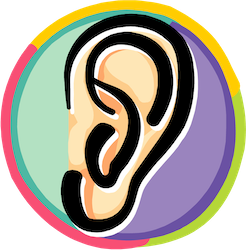Authors choose their words carefully. They may use imagery, literal and figurative language, and sound devices to make their writing more descriptive and engaging. An author's words can express his or her voice or that of a character in a story, even without stating it directly.
| Imagery is language that appeals to the reader's senses. |
 | |  | |  | |  | |  |
VISUAL
(sight) | | AUDITORY
(sound) | | OLFACTORY
(smell) | | GUSTATORY
(taste) | | TACTILE
(touch) |
Authors may use literal or figurative language to describe things through imagery. Literal language is based on the real, dictionary definitions of words. Figurative language uses words in ways that are not meant to be taken literally.
Imagery Using
Literal Language:
I could smell the aroma of freshly baked bread coming from the kitchen. I went into the kitchen and saw the dark brown loaf of rye bread sitting on the windowsill to cool. I couldn’t resist—I grabbed a sharp knife from the counter and cut a thick slice of the warm bread. I loved the strong taste of the caraway seeds that Mom always mixed into her homemade loaves of rye. I was so engrossed in enjoying the bread that I didn’t even notice that Mom had entered the kitchen until I heard the door close loudly behind her. Uh-oh! I was caught! |
Imagery Using
Figurative Language:
The aroma of freshly baked rye bread called to me from the kitchen. It was a beacon that guided me to the windowsill where the loaf was set to cool. I was powerless in the face of such immense temptation. The sharp knife sliced through the warm bread as smoothly as a butter knife through softened butter. The warm caraway seeds were like licorice drops melting in my mouth. I didn’t notice that Mom had come back into the kitchen until SLAM! The screen door closed behind her, and I spun around, caught red-handed! |
- End Rhyme: rhyming words at the ends of different lines
I wish that we could have more fun,
But now I see the day is done. |
| An author's use of language reveals his or her voice or that of a character. |
WHILE READING A TEXT, look for language that reveals an author's or character's
voice by asking yourself some questions:
- What kinds of words does the author use? Formal words? Or informal words like slang? Does he or she use fun or funny language? Or serious language?
- How do the characters in a story interact with each other? What is their dialogue like? Does what they say to each other reveal their feelings?
- How does reading the text make you feel? Does it make you laugh? Does it make you sad? Does it make you think about things differently?
Answers to these questions can reveal an author's or a character's voice.
❋ ❋ ❋ ❋ ❋ ❋ ❋ ❋ ❋ ❋ ❋ ❋ ❋ ❋ ❋ ❋ ❋ ❋ ❋ ❋ ❋ ❋ ❋ ❋ ❋ ❋ ❋ ❋ ❋ ❋ | Go to the next page to practice working with author's use of language. |


 5th Grade Reading - Author's Use of Language Lesson
5th Grade Reading - Author's Use of Language Lesson








